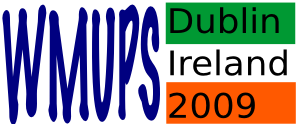Co-located with:
The Fourth International Conference on COMmunication System softWAre and middlewaRE - COMSWARE 2009
16th June 2009, Trinity College, Dublin, Ireland
News
- Workshop Program published
- List of accepted papers published
- New Workshop date: 16th June
- Deadline extended to 21st April 2009. 28th April 2009
-
Accepted
Papers
- Modeling and Simulation of a Multiagent Service Oriented Architecture for Pervasive Computing Systems - Moeiz Miraoui, Chakib Tadj, Chokri ben Amar
- Middleware for management of end-user programming of clinical activities in a pervasive environment - Giuliano Ferreira, Iara Augustin, Giovani Librelotto
- Context-based Heterogeneous Middleware Integration - Frederico Lopes, Flavia C. Delicato, Thais Batista, Paulo F. Pires
- Interests-Sensitive Data Dissemination Protocol for Vehicular Ad-hoc Networks - Amal El-Nahas
- A Semantic Middleware for Autonomic Wireless Sensor Networks - Atslands R. da Rocha, Flávia C. Delicato, José Neuman de Souza, Danielo G. Gomes, Luci Pirmez
Overview
The research interest in the area of pervasive and ubiquitous computing has recently experienced a significant grown. Such computing scenarios include applications endowed with context awareness and adaptive capacities and sensor instrumented environments where devices communicate through a Wireless Network. The building of software solutions for such scenarios involves a wide range of challenges due to the myriad of different applications to be considered, the specific requirements of such applications, as well as the multitude of hardware devices and communication technologies that constitutes the pervasive and ubiquitous computing scenario. To address such challenges researchers should investigate different and distinct areas of computing ranging from new technologies of Wireless Sensor and Actuator Networks and context provision platforms to software engineering techniques. Initial approaches to build software for pervasive and ubiquitous computing were based on the ad-hoc development of applications specifically tailored for a target technology and hardware platform. Recently, researchers have investigated the adoption of more structured and systematic approaches of development as those based on the employment of middleware platforms.
Scope
The Workshop on Middleware for Ubiquitous and Pervasive Systems (WMUPS) seeks to establish a forum for researches on the essential middleware services, abstractions and infrastructures as well as software engineering techniques and processes for busting the developing of software systems for pervasive and ubiquitous computing in general. Moreover, we intend to provide an effusive forum to discuss middleware concepts and services applied to a core technology in this scenario which are the Wireless Sensor And Actuator Networks (WSAN).
Topics
The topics
of the workshop include, but are not limited to:
Middleware Services for Wireless Sensor And Actuator Networks (WSAN)
- Naming, Location and Synchronization services
- Mobility
- Aggregation techniques and data management
- Energy-aware middleware mechanisms
- Cross layering and resource awareness
- Fault tolerance and reliability
- QoS management
- Privacy and security services
- Node Scheduling
- Topology management
- Resource discovery and management
Software engineering support for Ubiquitous and Pervasive Computing:
- Architectures and patterns
- Service-oriented archictures
- Dynamic reconfiguration and adaptation
- Agent technologies
- Model-driven Development
- Aspect-Oriented Techniques
- Test and simulation tools
Programming models and abstractions for Middleware for Ubiquitous and Pervasive Computing
- Middleware architectures and frameworks
- Autonomic Computing techniques (self-assembly, self-configuration, self-distribution)
- Middleware for Context Provision and management
- Web services for Ubiquitous and Pervasive Computing
Middleware for novel applications and emerging technologies for pervasive and ubiquitous computing
- Smart Spaces
- Ambient Assisted Lived
- Healthcare
- Disaster management
- Mobile TV
- Wireless and Mobile Technologies (WiMax, WiBree, LTE, etc.), Devices (e.g. MID, UMPC, wearables, etc) and Platforms (e.g. Android)
- Practical Experiences of Using Middleware for Ubiquitous and Pervasive Computing
Submission
Each paper will be reviewed by independent referees, according to significance, originality, technical content, style, clarity, and relevance to the workshop. Since the goal of the worshop is to generate a fruitfull discussion among the participants, at least one author of each accepted paper is expected to attend the workshop.
Submissions must be in the ACM format for conference proceedings. Templates can be found at the following URL:
http://www.acm.org/sigs/pubs/proceed/template.html
Authors using the LaTeX2e templates should also ensure that they use only Type 1 fonts. See the ACM FAQ:
Please apply the ACM Computing Classification categories and terms. The ACM Computing Classification scheme can be found at the following URL:
http://www.acm.org/class/1998/
Submissions should be in PDF format, sent to both fdelicato[at]gmail.com and wmups2009[at]dimap.ufrn.br and having the subject "WPMUS Paper Submission". The paper maximum number of pages is 6.
All accepted papers will be published via ACM's Digital Library as part of the ACM International Conference Proceedings Series. The ISBN number assigned to WMPUS 2009 is 978-1-60558-532-1.
Note: It is encouraged to propose recent ideas that are not still completly validated. This is a workshop, not a mini-conference.
Important Dates
Paper submission: April 16th 2009 Extended April 28th
Author notification: May 10th 2009
Manuscripts due:Thursday, May 14th 2009
Program Committee
Fabio Costa, UFG, Brazil
Flávia C. Delicato (Chair), UFRN, Brazil
Francois Taiani, Lancaster University, England
Geoffrey Coulson, Lancaster University, England
João M. Fernandes, Minho University, Portugal
Jose Bravo, Castilla-La Mancha University, Spain
José Marcos Nogueira, UFMG, Brazil
José Neuman de Souza, UFC, Brazil
Lidia Fuentes, Malaga University, Spain
Markus Endler, PUC-Rio, Brazil
Nadia Gamez, Malaga University, Spain
Paul Grace, Lancaster University, England
Paulo F. Pires (Chair), UFRN, Brazil
Renato Cerqueira, PUC-Rio, Brazil
Rene Meier, Trinity College Dublin, Ireland
Thais Vasconcelos Batista, UFRN, Brazil
Organizers
Flávia C. Delicato, Federal University of Rio Grande do Norte (UFRN), Brazil (fdelicato [at] gmail.com)
Paulo F. Pires, Federal University of Rio Grande do Norte (UFRN), Brazil (paulo.f.pires [at] gmail.com)

